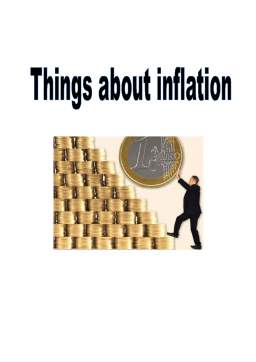Extras din referat
Inflation is an inevitable property of any economy in the world. In simple words, inflation is the rise of general level of prices. However, inflation is a much more complex phenomenon than simply the increase of prices. Inflation (or general inflation) is also identified with the fall of market value of money within a particular economic system. However, some economists prefer to use the term inflation to describe a rapid increase in money supply in a single economy. Generally, this is the main cause of the increase of prices.
“There is no opinion better established, though it is seldom consistently maintained, than that the general scale of prices existing in every country, is determined by the amount of money which circulates in it,” wrote Thomas Joplin in his writing Views on the Subject of corn and Currency in 1826.
History
An examination of historical examples, including Weimar Germany, 1970s Argentina, 1980s Brazil, post-Vietnam America, and China, can prepare an economy facing the threat of present-day inflation and teach its participants what to avoid and what can be done.The effects that inflation causes can weaken an economy to the point of collapse. Inflation and hyperinflation can have a tremendously negative affect on an economic society as seen in post World War II Germany (The Weimar Republic), 1970's Argentina, 1980's Brazil, post Vietnam War in America and the Peoples Republic of China, all economies that have fixed their economic and social woes created by inflation and its adverse effects. Taking a look at these past examples of inflation can prepare an economy facing present day inflation on what to avoid and what can be done. The economy facing economic hardships can learn how to handle the social impacts, how to create a successful plan that can lower inflation and restore a country to some form of economic balance and how the government influences inflation.
General effects
An increase in the general level of prices implies a decrease in the purchasing power of the currency. That is, when the general level of prices rises, each monetary unit buys fewer goods and services. The effect of inflation is not distributed evenly in the economy, and as a consequence there are hidden costs to some and benefits to others from this decrease in the purchasing power of money. For example, with inflation, lenders or depositors who are paid a fixed rate of interest on loans or deposits will lose purchasing power from their interest earnings, while their borrowers benefit. Individuals or institutions with cash assets will experience a decline in the purchasing power of their holdings. Increases in payments to workers and pensioners often lag behind inflation, especially for those with fixed payments.
Negative effects
High or unpredictable inflation rates are regarded as harmful to an overall economy. They add inefficiencies in the market, and make it difficult for companies to budget or plan long-term. Inflation can act as a drag on productivity as companies are forced to shift resources away from products and services in order to focus on profit and losses from currency inflation. Uncertainty about the future purchasing power of money discourages investment and saving. And inflation can impose hidden tax increases, as inflated earnings push taxpayers into higher income tax rates unless the tax brackets are indexed to inflation.
Positive effects
Labor-market adjustments
Keynesians believe that nominal wages are slow to adjust downwards. This can lead to prolonged disequilibrium and high unemployment in the labor market. Since inflation would lower the real wage if nominal wages are kept constant, Keynesians argue that some inflation is good for the economy, as it would allow labor markets to reach equilibrium faster.
Bibliografie
http://www.ecb.int/home/html/index.en.html
http://www.reuters.com/article/2011/10/30/us-ecb-trichet-inflation-idUSTRE79S3D920111030
http://en.wikipedia.org/wiki/Inflation
Preview document
Conținut arhivă zip
- Inflation.docx















